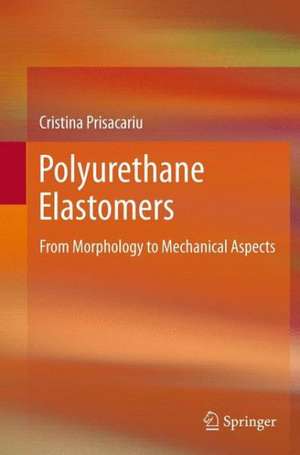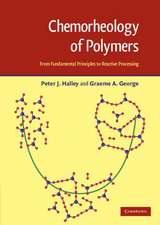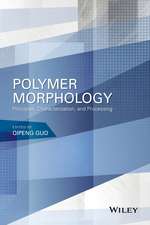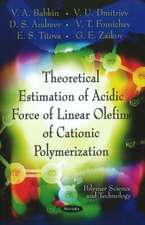Polyurethane Elastomers: From Morphology to Mechanical Aspects
Autor Cristina Prisacariuen Limba Engleză Hardback – 3 iul 2011
| Toate formatele și edițiile | Preț | Express |
|---|---|---|
| Paperback (1) | 1216.02 lei 6-8 săpt. | |
| SPRINGER VIENNA – 12 oct 2014 | 1216.02 lei 6-8 săpt. | |
| Hardback (1) | 1222.94 lei 6-8 săpt. | |
| SPRINGER VIENNA – 3 iul 2011 | 1222.94 lei 6-8 săpt. |
Preț: 1222.94 lei
Preț vechi: 1491.38 lei
-18% Nou
Puncte Express: 1834
Preț estimativ în valută:
234.04€ • 243.44$ • 193.21£
234.04€ • 243.44$ • 193.21£
Carte tipărită la comandă
Livrare economică 15-29 aprilie
Preluare comenzi: 021 569.72.76
Specificații
ISBN-13: 9783709105139
ISBN-10: 3709105137
Pagini: 255
Ilustrații: XXIV, 255 p.
Dimensiuni: 155 x 235 x 23 mm
Greutate: 0.59 kg
Ediția:2011
Editura: SPRINGER VIENNA
Colecția Springer
Locul publicării:Vienna, Austria
ISBN-10: 3709105137
Pagini: 255
Ilustrații: XXIV, 255 p.
Dimensiuni: 155 x 235 x 23 mm
Greutate: 0.59 kg
Ediția:2011
Editura: SPRINGER VIENNA
Colecția Springer
Locul publicării:Vienna, Austria
Public țintă
ResearchCuprins
Introduction. - 1 Chemistry of PUs.- 2 Hydrogen bonding in polyurethanes.- 3 PUs morphology and thermal behaviour.- 4 PUs Mechanical Properties.- 5 Sensitivity of elasticity to PUs chemical and physical structure.- 6 PUs strain induced orientation and crystallization.- Conclusions.- Perspectives.
Recenzii
Jiri G. Drobny, President
Drobny Polymer Associates
Merrimack, NH USA
The book is written by a true expert on the subject. It is not only a review of the state of the art but also a collection of new contributions in some specialized areas. The size of the publication is only 250 pages but it is amazing how much it covers: chemistry, structural studies, thermal behavior, mechanical aspects, morphology, new developments, and perspectives. The treatment of the subject is thorough and systematic, yet the text is clearly written and the style is readable. Given that, the book will be a very useful resource for a wide range of readers, from advanced students to university educators and scientists working in the field of polyurethane elastomers.
Drobny Polymer Associates
Merrimack, NH USA
The book is written by a true expert on the subject. It is not only a review of the state of the art but also a collection of new contributions in some specialized areas. The size of the publication is only 250 pages but it is amazing how much it covers: chemistry, structural studies, thermal behavior, mechanical aspects, morphology, new developments, and perspectives. The treatment of the subject is thorough and systematic, yet the text is clearly written and the style is readable. Given that, the book will be a very useful resource for a wide range of readers, from advanced students to university educators and scientists working in the field of polyurethane elastomers.
Textul de pe ultima copertă
A comprehensive account of the physical / mechanical behaviour of polyurethanes (PU´s) elastomers, films and blends of variable crystallinity. Aspects covered include the elasticity and inelasticity of amorphous to crystalline PUs, in relation to their sensitivity to chemical and physical structure. A study is made of how aspects of the constitutive responses of PUs vary with composition: the polyaddition procedure, the hard segment, soft segment and chain extender (diols and diamines) are varied systematically in a large number of systems of model and novel crosslinked andthermoplastic PUs. Results will be related to: microstructural changes, on the basis of evidence from x-ray scattering (SAXS and WAXS), and also dynamic mechanical analyses (DMA), differential scanning calorimetry (DSC) and IR dichroism. Inelastic effects will be investigated also by including quantitative correlations between the magnitude of the Mullins effect and the fractional energy dissipation by hysteresis under cyclic straining, giving common relations approached by all the materials studied. A major structural feature explored is the relationship between the nature of the hard segment (crystallising or not) and that of the soft segments. Crystallinity has been sometimes observed in the commercial PUs hard phase but this is usually limited to only a few percent for most hard segment structures when solidified from the melt. One particular diisocyanate, 4,4’-dibenzyl diisocyanate (DBDI) that, in the presence of suitable chain extenders ( diols or diamines), gives rise to significant degrees of crystallinity [i-iii] and this is included in the present work. Understanding the reaction pathways involved, in resolving the subtle morphological evolution at the nanometre level, and capturing mathematically the complex, large-deformation nonlinear viscoelastic mechanical behaviour areassumed to bring new important insights in the world basic research in polyurethanes and towards applied industrial research in this area.
Caracteristici
Brings important new insights into the basic research of polyurethanes and their industrial applications The special DBDI based PUs covered help scientists understand the role of introducing an enhanced crystallinity to the overall properties of such polyurethanes and of elastomeric materials in general Presents break-throughs in understanding at a quantitative level the relation between detailed polyurethane chemical structure and the in-use performance of the PU Includes supplementary material: sn.pub/extras













